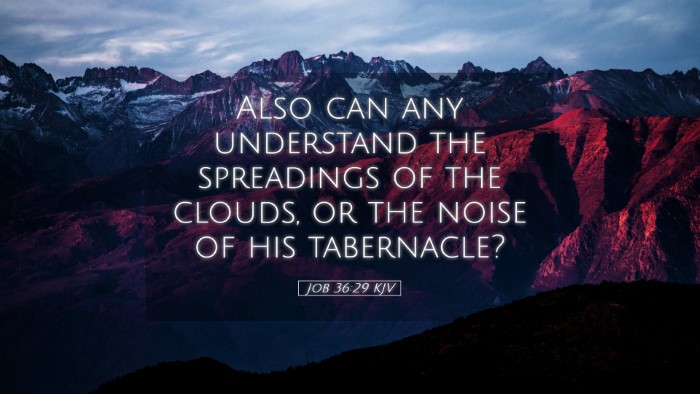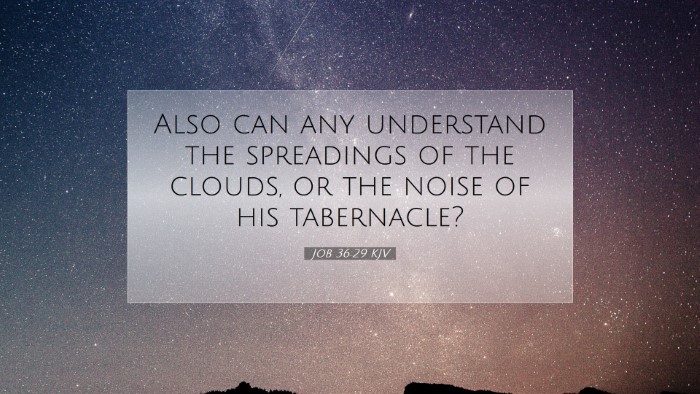Commentary on Job 36:29
Verse Text: "How then can man understand the number of his days?"
This verse, situated within the discourse of Elihu, serves as a poignant reminder of the limitations of human understanding in the face of divine wisdom. The commentary explored below synthesizes insights from renowned public domain commentaries to provide a comprehensive examination of this profound scriptural statement.
1. Contextual Analysis
The chapter of Job 36 stands as a vital portion of Elihu’s speech, the youngest friend of Job, who seeks to clarify and explain God's justice. Elihu’s approach embodies a theological reflection that combines reprimand and revelation.
He articulates a vision of God that is both transcendent and immanent, positioning the divine nature in stark contrast with human limitation. The rhetorical questions posed in this passage compel readers to reflect on their understanding of life and divine providence.
2. Insights from Matthew Henry
Matthew Henry emphasizes the theme of divine sovereignty and human ignorance. He underscores that God's omnipotence is beyond human comprehension, particularly regarding His governance over life and death. Henry explains that the inquiry regarding the "number of days" is not merely about mortality but also delves into the understanding of God's purposes in allowing suffering and the brevity of human life.
- Human Limitation: Henry suggests that our inability to understand the breadth of divine operations points to our creaturely limitations.
- God’s Purposes: He argues that God's purpose in allowing calamity is meant for our eventual good, even when such an understanding eludes us.
3. Insights from Albert Barnes
Albert Barnes elaborates on the theological implications of the verse, interpreting Elihu’s remarks as a call to humility before God. He points out that the "number of days" is a metaphor for human life's ephemeral nature and a reminder of the fragility of existence.
- Limited Knowledge: Barnes notes that humanity generally lacks the capacity to discern the limits of God's plans, reinforcing the importance of faith.
- Call to Awe: He encourages a posture of awe and reverence towards God's unsearchable ways, motivating believers to seek understanding through reliance on God rather than their intellect.
4. Insights from Adam Clarke
Adam Clarke provides a detailed examination of the language and structure of the text, noting how it speaks to the overarching theme of divine majesty and mystery. Clarke interprets this verse within the broader context of God's sovereignty over creation—suggesting that while we can observe God's handiwork in nature, the full extent of His governing will is hidden from us.
- Divine Majesty: Clarke emphasizes that while we can see the "works of God," comprehending their full significance is beyond our reach.
- Faith in Mystery: He championed faith as an essential response to the complexities of life, asserting that we must trust in God, even when we cannot see His plans clearly.
5. Theological Implications
This verse presents critical theological implications that resonate through the ages. The struggle to understand the divine decree and our place within it opens avenues for exploration in pastoral care, theological education, and personal spirituality.
- The Mystery of Divine Providence: The reminder that human understanding is limited merits discussion on the mystery of God's providential care. Believers are encouraged to dwell in the reality of faith amid uncertainty.
- Ethics of Suffering: The verse invites dialogue about the ethics of suffering, encouraging students and theologians to explore how suffering fits within the framework of God's justice and love.
- Exhortation to Prayer: In light of such profound mysteries, the call to prayer becomes paramount, inviting individuals to seek God’s wisdom and understanding in every season of life.
6. Conclusion
Job 36:29 serves as a crucial reminder of the gap between divine and human wisdom. As pastors, students, theologians, and scholars engage with this text, it is essential to embrace the tension between seeking understanding and accepting mystery. Through the insights garnered from Henry, Barnes, and Clarke, we are equipped to confront the complexities of life with a posture of faith, trusting in the infinite wisdom and providential care of God.


